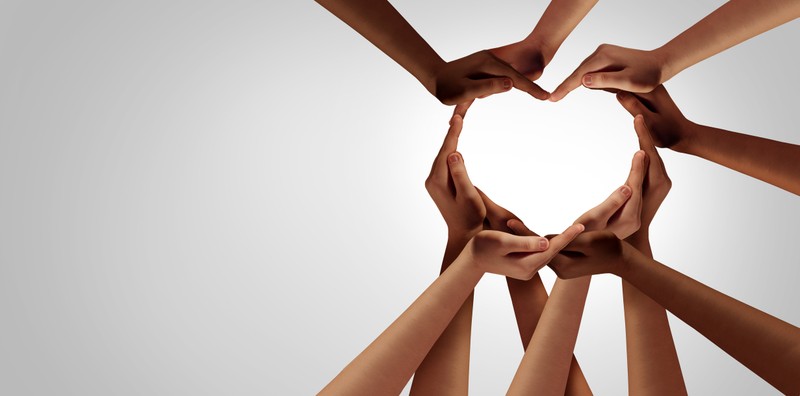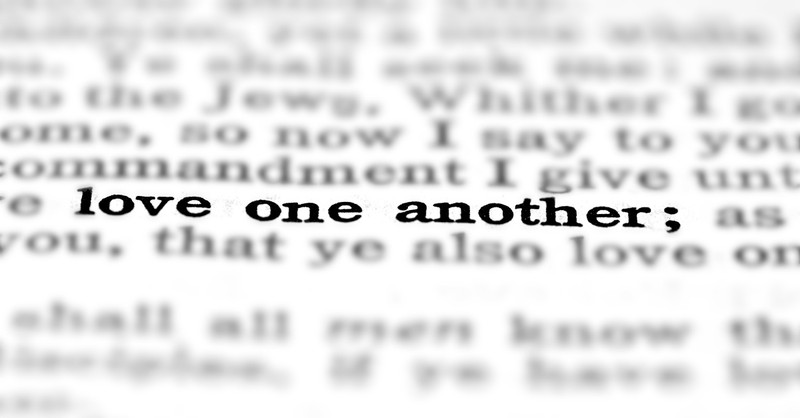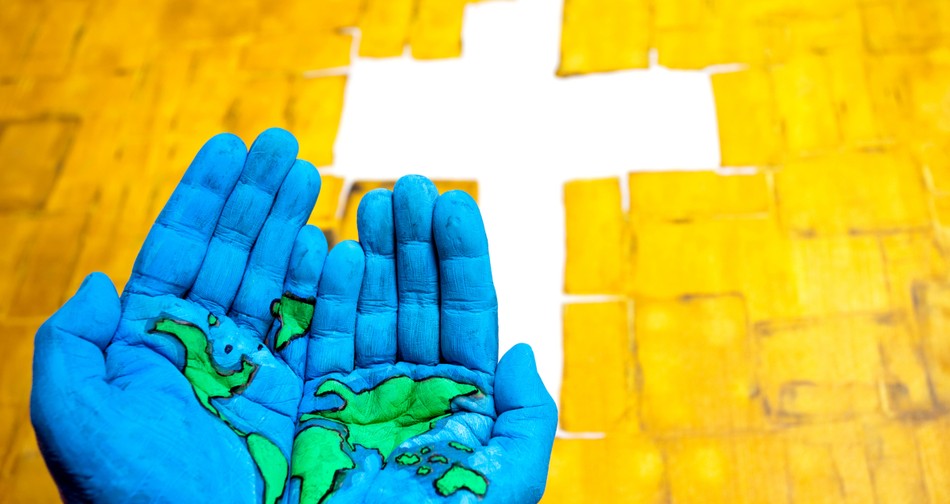Click below to listen to this article:
The realities of the last few weeks in May and June 2020 have caused a wide range of emotions. From anger to sadness. From desire to see things change...to despair that it will remain the same. Knowing that what has happened should never happen, yet wondering if this is how it’s always going to be.
However, I know we serve a God who loves everyone, hates injustice, and hates when people are divided. With this in mind, the question that leaps into my mind (and I hope yours, too) is how do we heal?
Healing this problem in our nation will not be easy. But my goal in writing this article is not to be easy but to be challenging. I ask you to open your heart and prayerfully consider what you are about to read. If I accomplish my goal then it will lead you to think or re-think your position on race in our country. It’s time we stop looking through our natural eyes and begin to see as Jesus would see.
When Jesus engaged people he often asked questions. Today I want to ask you three questions that I believe Jesus would ask if he was walking the earth.
Photo Credit: ©GettyImages/VikramRaghuvanshi

1. What’s In Your Heart?
Very few people would ever admit, at least publicly, that they have racist thoughts or tendencies. Truth is, the majority of people—black, brown or white—are not racists. Yet we know racism exists in our society, in our justice system, and unfortunately even in our churches. By the way, racism is not something that just exists in white people. Black, brown, and people of all shades can be racist, too.
Martin Luther King Jr said: 11am on Sunday morning is the most segregated hour in our country. The reason that is troubling is that it speaks to an issue that may not dwell on the surface but lives beneath it.
In other words, you might not be racist, but the ideas and thoughts, perpetuated in our society, by media and otherwise, can impact the way you feel about people of other races. That’s why if Jesus was here, the first thing he would want you to do is examine your heart.
This means...consider the conversations you have, not when everyone is watching, but in your private moments. Whether you are at the dinner table, in your living room, or in places you know you can speak freely and no one is watching or listening. Those moments will reveal everything that is in your heart.
Here is what Jesus said:
A good man brings good things out of the good stored up in his heart, and an evil man brings evil things out of the evil stored up in his heart. For the mouth speaks what the heart is full of. – Luke 6:45
So, how do you examine your heart? Take a moment to answer these five questions:
1. How do your conversations about race go when you are in a “safe space?”
2. What did you say when you heard another black man was killed by a police officer?
3. Did it change when you saw the video?
4. What did you say about the people who were marching to protest what happened to George Floyd?
5. What did you say about the small group of people who were seen rioting, looting, burning police cars, and destroying small businesses?
Again, don’t think about what you said publicly, what was in your heart? What did you say in those secret places?
By the way, these questions are not just aimed at white people. These questions are for every person of every race. I know these aren’t easy questions to answer (especially if we want to be completely honest) but if we are going to heal racism in our society these are the types of questions that need to be addressed.
The problem isn’t the conversations you have when you are out in the world. The problem is the conversations you have when you are in your home. What are you saying then?
A pastor I know from a very popular church (if I mentioned the name you'd immediately recognize him) said he's been invited to speak at various places. Often, prior to the service, they would gather in the green room and natural conversations would take place. He said he was shocked by the things he heard. There were disturbing discourses and off-color jokes about people of different races. He thought this was absolutely appalling to the point where he questioned if these men even knew Jesus.
Now, none of these men would stand in the pulpit and say these things publicly. But the fact that they did it “behind closed doors” revealed what’s in their heart. If we want our society to heal from racism we have to deal with the attitudes of the heart. We need to pray open and honest prayers like David did in the Psalms:
Search me, O God, and know my heart; test me and know my anxious thoughts. Point out anything in me that offends you, and lead me along the path of everlasting life. – Psalm 139:23-24 (NLT)
Let’s not assume these attitudes don’t exist within us. Let’s go before God and let him reveal to us if these attitudes actually exist within us. If he should point out anything, we need to repent—and ask for grace to begin to change them.
Healing racism in our country will not happen until there is a change of heart. This is the starting point.
Jesus knows that if he can change the heart, the man will follow. As Proverbs 23:7 reminds us as a man thinks in his heart, so is he. The question I have for you then is what is in your heart?
When we solve the problem of the heart we are well on our way to healing from racism.
Photo Credit: ©GettyImages/wildpixel

2. What Are You Doing with Your Hands?
In Matthew chapter 8, Jesus had just come down from the mountainside after preaching the sermon on the mount. There was a massive crowd following him when suddenly a man with leprosy approached Jesus and knelt before him asking to be made clean. I know we read this today and we don’t think much of it; but to be a leper in that society was to be an outcast.
Lepers stayed to themselves because they were not welcome in the everyday society or community. People thought they were cursed because of some sin they committed and they would not come within six feet of them. On a windy day, they wouldn’t come within 150 feet of them—all because of fear and rejection. In other words, the people didn’t care about the feelings or the challenges the leper was facing, they didn’t want that leper imposing or interfering in their own lives or situations.
In this moment in Matthew 8, after preaching his greatest sermon with crowds surrounding him, Jesus did something shocking. He reached out and touched the leper. He touched the one who was the outcast. The one who was rejected and marginalized. The one who was told: you don’t belong here with us, stay over there with your own kind.
He demonstrated for us what love and compassion look like in action. He did something with his hands that no one else in that crowd was willing to do. My question to you today is what are you doing with your hands?
If we are going to follow Jesus’ example and heal racism in our society we have to be willing to get our hands dirty and do the things that possibly no one else around you may want to do. This may involve education. This may involve activation. This may involve conversation.
Regardless of which way it happens, Jesus wants us to reach out our hands and touch those that other people may be afraid or unwilling to touch. In the case of the lepers, many of the people’s fears and worries were based on superstition and not wanting to be inconvenienced. Because they didn’t want this leper interfering with their life, let’s put them in colonies so they could keep living and keep these lepers out of sight and out of mind.
Many people are looking forward to the end of these protests so they can get back to normal and back to their lives. They don’t want to have to worry about these issues of race that plague our society, it’s too much of an inconvenience. Can’t we just treat it like the leper and let it go away, out of sight out of mind? Jesus would say no.
You have to use your hands, in the places you are in, to reach out and make a difference. Isn’t that what salt and light are anyway? I know these things are not comfortable to do, but it is the only way we will ever heal from racism in our society. I strongly believe this is what Jesus would say and do. Note these words in Matthew 25:35-40:
For I was hungry and you gave me something to eat, I was thirsty and you gave me something to drink, I was a stranger and you invited me in, I needed clothes and you clothed me, I was sick and you looked after me, I was in prison and you came to visit me. Then the righteous will answer him, ‘Lord, when did we see you hungry and feed you, or thirsty and give you something to drink? When did we see you a stranger and invite you in, or needing clothes and clothe you? When did we see you sick or in prison and go to visit you?’ The King will reply, ‘Truly I tell you, whatever you did for one of the least of these brothers and sisters of mine, you did for me.’ – Matthew 25:35-40
Let that soak in your heart just a minute before you go on.
Photo Credit: ©GettyImages/Rawpixel

3. Are You Willing to Pay the Price?
Let’s face the reality: trying to end racism in our society may cost you something. You may discover that people you count as friends may not be so friendly anymore. It will be easier if you are surrounded by those who see the problem and want to change it. However, there are still people who don’t see the problem.
When you really begin to challenge the way people think about matters of race, not everyone is going to be cheering for you. When Jesus exposed the Pharisees and the teachers of the law for their hypocrisy, they immediately began plotting how they could kill him. These were the religious people. The people who had the law. The people who should know better.
Don’t be surprised if everyone is not on board with the need to change race relations in our country. In spite of that, will you do it anyway? Will you try to have a conversation with someone who is different than you? Will you step outside what's comfortable and do what is uncomfortable—without ever knowing if it will make a difference?
This is what Jesus wants us to do. Are you willing? Remember these words:
Then Jesus said to his disciples, "Whoever wants to be my disciple must deny themselves and take up their cross and follow me.” – Matthew 16:24
Healing racism in our society will require you to step outside of your experiences and—as best as possible—walk in the shoes of someone else. Recognize that someone’s experience may be completely different than your own. And just because you didn’t experience it, that doesn’t eliminate or mitigate that person’s reality.
In other words, you have to accept the truth that life may be a little bit different for people who don’t look like you. When you feel that and understand that, then and only then can you start making steps to heal that. This is the cross that is required for us to carry.
Photo Credit: ©GettyImages Boonyachoat

Healing through Reconciliation
The work of healing racism is really the work of reconciliation. This is what Jesus was all about. He reconciled us back to the Father and he wants to reconcile relationships among all of us. It is hard work, that could come at a great price, but it can produce a great reward.
Before Jesus left the earth, he instructed the disciples to go preach the gospel and wait for power from the Holy Spirit to do it. At the heart of the healing will be the need to proclaim the gospel: For God so loved the world.
If we will go forth with the love of Jesus in our hearts, and in the power of the Holy Spirit, we will make a difference in this world. It doesn’t mean we will change every heart. It does mean that we will shine light and represent Christ well in this society. If we do this, I believe many people will fall in love with this beautiful savior because we will be living examples of the gospel of Jesus Christ.
This is the only hope for our world. Remember this:
“Jesus told his disciples By this everyone will know that you are my disciples, if you love one another.” – John 13:35
God’s love in our hearts, shed abroad to all people.
This is how we begin to heal the problem of racism in our society; and this is what I believe Jesus is saying today.
Photo Credit: ©GettyImages/eric1513





